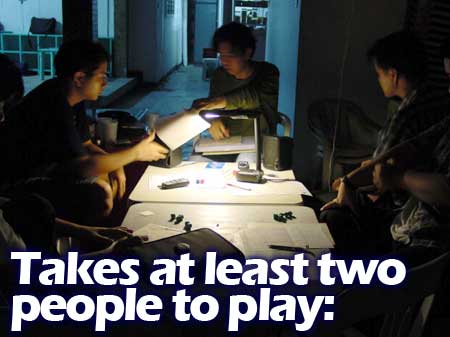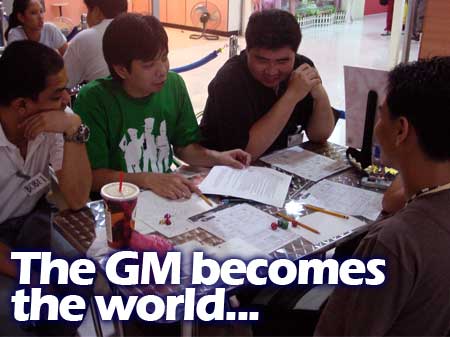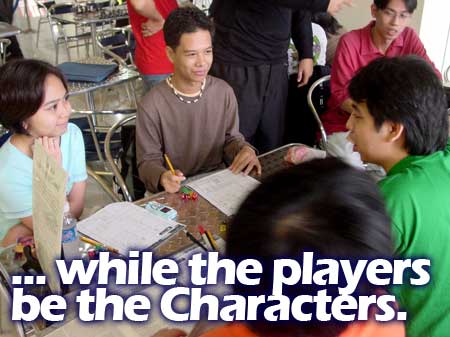Roleplaying Games?
To define what a role playing game is we first look at what it is to play a role, what a game is, then tie the concepts together.
Defining: Roleplaying
Have you ever
-
played cops and robbers?
-
played cowboys and Indians?
-
pretended to be something else be it astronaut, fireman, policeman, soldier, monster, singer, actor, superhero, knight, teacher, your mom or dad, or whatever else?
-
played house?
-
attended a party in costume?
-
said "If I were him I'd do it this way
"?
-
answered the question "What would you like to be when you grow up?"?
-
acted in a skit, play, or movie?
- - played a computer game?
-
imagined you were a character from a fairy tale, novel, or movie?
If you've ever done any of these you have already played a role. The very essence of playing a role is simply pretending that you are someone or something else in an imaginary world often other than reality.
Defining: Games
When kids play cowboys and Indians you will all too often hear "I shot you!" to which comes the reply "No, you missed!" and the argument continues. When in a costume party or pretending to be an astronaut one's pretense usually serves no particular end, the fun is simply in being. When acting in a play one is bound to a script.
Unlike acting in a play Games give players the freedom to take the character where they wish, in which case it more resembles improvisational theatre. Unlike the aimless play in costume, Games have a point or objective whether it be the achievement of a goal or simply the telling of a compelling narrative. Unlike the cowboys and Indians of younger days, Games come with rules to determine success or failure of actions.
Defining: ROLEPLAYING GAMES
Putting it all together: a Role Playing Game is an interactive exercise where players pretend to be their characters, making decisions regarding their character's actions in order to achieve an objective or tell a story. Rules assist in resolving actions and defining the imaginary world, be it realistic or fantastic, that the characters inhabit.
If you said Yes to any of the items listed above, then you probably realize that roleplaying games are very easy to get into
and do not require any previous experience to enjoy.
Learn more about roleplaying games by reading the articles below:
- Name of Article by Author
- Name of Article by Author
- Name of Article by Author
|

A TYPICAL ROLEPLAYING GAME GROUP: A typical roleplaying game group consists of at least two people. One is generally known as the Game Master and the other is the Player. While some games have more unique or interesting twists to their rules, a typical roleplaying game as the Player portraying a specific character in a game, and the Game Master handling everyone else and the very world the game is set in. |

THE GAME MASTER: The Game Master (or Storyteller, Dungeon master, Holly Hock God, etc) is the one responsible for setting up the world and the story or the objective. The GM manages all the characters and objects existing in that world except for the characters run by the players.
The GM with the help of the game rules also manages the flow of events by determining the results of actions the players' characters take. Simply stated, the GM becomes the RPG world. |

THE PLAYERS: The Players each take on the role of one character of that game world. You can think of that character as the player's playing piece. Each player declares actions their characters would take according to how they deem the characters would behave given the situation existing at any time. Putting it in a movie analogy, the players play the lead characters of the movie, except they do not follow a script, instead reacting to events as they happen.
|
|